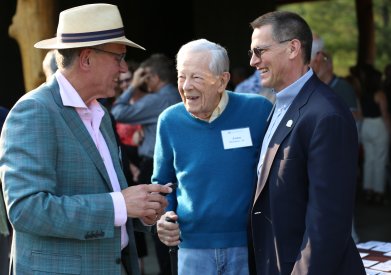To Brazil With Love
October 24, 2016
Dear Government of Brazil,
My name is Daniel Wolfson. I’m the EVP/COO of the ABIM Foundation, which created the Choosing Wisely campaign. First off, thank you for your interest in the campaign. I was happy to hear you were so enthusiastic about having a Choosing Wisely campaign in your country and I heard you have already convened a meeting with the Brazilian National Health Agency. I just wanted to point out a few details.
There are a number of principles that campaigns in other nations have agreed to, and we hope to add Choosing Wisely Brazil to that list. These principles, which are based on how we have conducted the campaign here in the US, are:
- Key messages in the campaign must emphasize quality of care and harm prevention, rather than cost reduction.
- The campaign must be patient-focused and involve efforts to engage patients in the process, as communication between clinicians and patients is central to Choosing Wisely. Patients or groups representing patients’ interests should be engaged in the development and/or implementation of the campaign.
- The recommendations issued by the participating organizations of the campaign must be evidence-based and reviewed on an ongoing basis to ensure credibility.
- Choosing Wisely is multiprofessional. Where possible, the campaign should include physicians, nurses, pharmacists and other health care professionals.
- Processes used to create the recommendations must be public and any conflicts of interest must be declared.
- The campaign must be clinician-led (as opposed to payer/government-led). This is important to building and sustaining the trust of clinicians and patients.
This last principle is key here and is motivating this letter to you. I am admittedly concerned that you are taking a leadership role in your nation’s efforts.
Now don’t get me wrong, governments like Brazil have a role in Choosing Wisely. In the USA, without the passing of the Affordable Care Act (ACA) and the subsequent movement from a volume- to a value-based payment system, Choosing Wisely would have little or no traction. In fact, Choosing Wisely has been integrated into several educational programs sponsored by the U.S. government. (It has also provided important data on their beneficiaries and we are currently participating in a project funded by an NGO created through the ACA to identify priorities for measures to evaluate interventions in reducing low-value care.)
It’s just that the Choosing Wisely campaign was designed to engage physicians, clinicians and patients in a conversation that would increase awareness of wasteful tests and procedures. Empowering both physicians and patients in leadership roles is what is powerful and almost magical about the campaign.
But have no fear, the profession in your country is stepping up to the challenge. Several specialty societies in Brazil have already reached out to us about participating in a Choosing Wisely campaign Brazilian-style. In fact, Guilherme Barcellos, MD, a hospitalist physician, has already tweeted about the first medical school in Brazil developing a Choosing Wisely list of unnecessary tests and procedures.
I look forward to hearing how the campaign develops in your country. I would love to come and visit Brazil to see how much progress the specialty societies have made and how you have been supporting their work.
And thank you for hosting the Olympics, by the way. They were great; I particularly enjoyed the opening and closing ceremonies.

Daniel B. Wolfson
EVP & COO, ABIM Foundation


